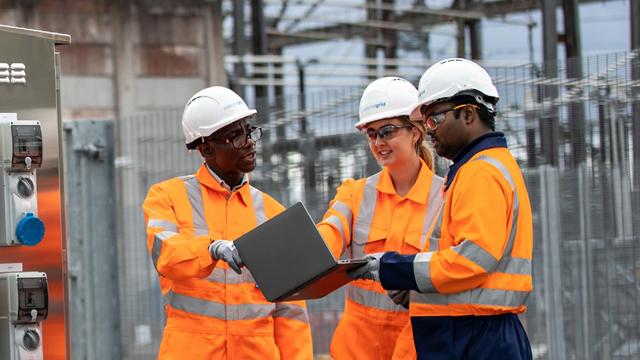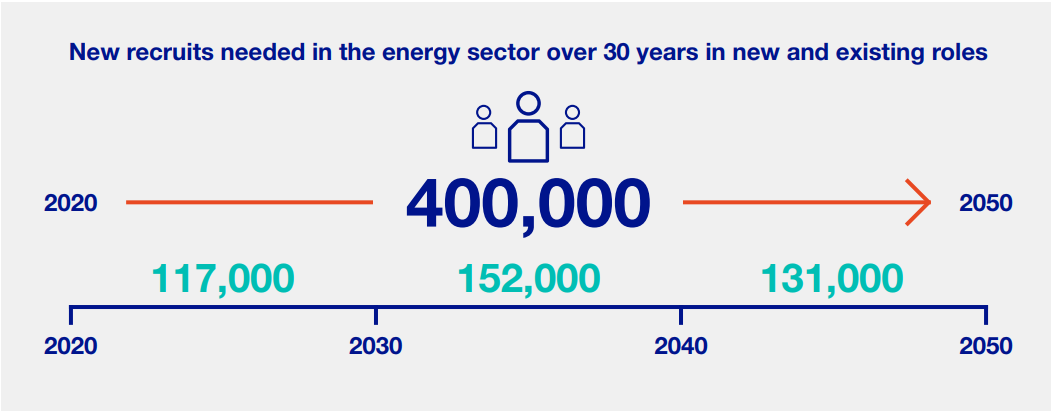How important is DEI in creating a net zero future?
Delivering a future of net zero carbon emissions by 2050 will require fundamental transformation in many aspects of our society, so how important is the role of diversity, equity and inclusion (DEI) in achieving this net zero future?
Research by National Grid and POWERful Women examines the relationship between DEI and net zero, and shows how DEI is essential in achieving net zero in three key areas:
1. To enable the industry to find innovative solutions
DEI will challenge group think and traditional ways of thinking, bring diversity of thought, ideas and experience and provide new solutions.
2. To better appreciate the needs of society
When the industry represents the diversity of the people it serves, it can better take account of their voices, design equitable solutions and bring society and consumers along in this change journey.
3. To build a net zero workforce
DEI creates a broader, more diverse and more inclusive talent pool where new skills and capabilities are brought in, cultivated and retained.
Read more about the role that DEI plays in overcoming these three challenges.
How does DEI enable innovative solutions for achieving net zero?
Innovation is critical to achieving a pathway to net zero. It will be key to delivering the electrification of transport, industry and buildings, capturing carbon at scale, and shifting towards alternative sustainable biofuels. The IEA estimates that more than a third of the emissions reductions required to reach net zero will stem from technologies that are not yet available today1.

1. DEI is a proven enabler of innovation
Various studies have demonstrated a link between diversity and innovation. Examples include:
- A BCG study of 1,700 companies identified a strong positive correlation between diversity of management teams and innovation success2. The report shows that organisations with greater gender diversity saw disruptive innovation in which a new product, service or business model fully replaces the version that existed before and generated about 34% of their revenues from innovative products and services.
- A follow-up study highlighted that companies with above-average diversity in their management teams reported innovation revenue 20% higher than companies with below-average leadership diversity3.
- A 2020 study by Bloomberg showed that companies with higher gender diversity had larger intangible assets (such as patents, copyrights, trademarks) and R&D expenses4.
2. 'Group think' is a key challenge to identifying the energy solutions of tomorrow
The more diverse the characteristics are of team members, the more varied perspectives they will bring to the table. When supported with an inclusive culture that ensures individuals feel safe to be themselves, express their opinions and challenge peers and leaders, innovation will flourish.
Leaders and managers ultimately play a critical role in establishing an inclusive culture and encouraging openness, ensuring equity and supporting innovation.
At a time when we need to move faster towards a clean energy transition, it’s crucial the energy industry has the right mix of mindsets and perspectives to overcome the challenges in the years to come, and also leverage opportunities along the way.
– Cordi O’Hara, President of Electricity Distribution, National Grid
3. To achieve net zero by 2050, an unprecedented level of innovation is needed across the energy industry
This will be supported by organisations with stronger diversity, equity and inclusion practices, which could identify transformative approaches, business models and new ways of working.
Across our study, 62% of respondents believe that DEI can help to overcome innovation challenges to reach net zero. 83% of respondents agree or strongly agree to the statement 'DEI results in better, more innovative solutions to problems'. As diversity is a proven enabler of innovation, it plays a critical part of delivering the technology, systems and ideas needed to enable net zero.
How does DEI allow us to better appreciate the needs of society?
Society's support and behaviour changes are key to reaching net zero. According to the International Energy Agency (IEA) 'Behavioural changes that affect the way people use energy are an important part of the toolkit for reaching net zero emissions by 2050'5.
The UK’s Committee on Climate Change highlights that 'Net zero will require major progress in all sectors and behavioural shifts play a much greater role'6.
1. The energy transition impacts all of society differently and everyone should be brought along on the journey
Climate change tends to impact vulnerable groups and UN figures indicate that 80% of the people displaced by climate change are women7. It's essential that the needs of these groups are considered in order to earn their support and ensure the transition is fair.

2. Diversity in decision-making helps achieve more inclusive decisions
More inclusivity and participation improves the quality of decision-making because it incorporates a wider range of perspectives and expertise. Climate Assembly UK highlights that involving diverse groups in decision-making improves decision quality and acceptability8.
3. Society has the power to veto net zero – or bring it to life
Organisations with stronger DEI practices will receive stronger support from society. 75% of respondents in our survey believe that DEI can help to achieve consumer support and behaviour change. 86% of respondents agree or strongly agree to the statement 'DEI enables better representation of consumers and understanding their needs'.
Having a representative workforce ensures the desires and concerns of all of society are considered during decision-making and messaging, which can help to achieve support and behaviour change needed for our net zero future.
Why is DEI needed to build a net zero workforce?
The drive to net zero is creating a fundamental shift within the energy sector, requiring more talent and a wider variety of skills and capabilities. Energy companies need to build highly skilled, experienced workforces with the relevant abilities to deliver the changes needed to reach net zero9.
Our research estimates that the UK energy industry will need to recruit for ~400,000 jobs by 2050, of which 260,000 will be new roles and 140,000 will be replacing those who have left the workforce10.

1. DEI can help to fill the skills gaps required for a complete net zero workforce
The energy sector faces a critical skills gap to reach net zero. Factors contributing to this challenge include:
- Different capabilities will be needed than are currently required
- One fifth of the workforce is expected to retire by 2030
- There is a war for talent with other industries
- There is a narrow pipeline of young people pursuing STEM (science, technology, engineering and maths) qualifications11.
Research published by the Committee on Climate Change (CCC) in May 2023 revealed that net zero offers the potential for significant net employment creation in the UK, with estimates of between 135,000 and 725,000 net new jobs in low-carbon sectors; such as buildings retrofit, renewable energy generation and electric vehicles. The CCC concludes that this will require active reskilling and upskilling of the workforce in key areas, as well as the need for government support12.
2. We also need to cultivate existing talent
As well as attracting new and diverse talent and skills, we should ensure that existing talented people are retained and progressed. Research by POWERful Women in 2022 revealed that many barriers to career progression still exist for women in middle management in the energy sector, risking a talent exodus at this critical time13. Companies can retain talented people and capture the skills for net zero by creating a supportive workplace culture and ensuring that policies – such as flexible working and development programmes – are implemented effectively and fairly.
3. The energy sector is missing out on a diverse workforce
Despite making up 48% of the global labour force, women only account for an estimated 32% of the global energy sector workforce - while racial and ethnic minorities account for 22%14.
POWERful Women highlights that, at senior level, just 29% of all board seats and 16% of executive board roles across the UK energy sector were held by women in 2023, with more than one fifth (21%) of the top 80 energy companies still having all-male boards15. Further to this, minorities continue to be under-represented in critical STEM subjects, with women making up just 18% of first year engineering and technology undergraduates in the UK16.
Increasing the representation of women in the energy sector must play a critical role in building diversity. National Grid’s 50/50 Women in Engineering programme is designed to increase the female engineering population and this, alongside other internal schemes, helps to break down the barriers to progression of female engineers and take a step towards building a more diverse net zero workforce.
4. Leveraging more diverse talent pools will help to build a net zero workforce
The skills gap cannot be filled by simply pulling from the existing talent pool, the net must be cast wider17.
Broadening talent pools can help the industry access more people to fill the large number of jobs required. To reach net zero, engineering skills will need to be complemented with a wider skillset, including digital and AI, communication and change management. DEI increases the probability that the skills required will exist within the workforce18&19, as diverse talent brings a variety of experience, knowledge and skills.
5. Careers that support net zero can attract more talent and more diverse talent
Research shows that, on average, 57% of UK adults want to work for an organisation that contributes to net zero and 83% of women want to help the UK reach its net zero target20. Climate change risk perception and concern are also consistently higher among women than among men21.
References
1 Energy Technology Perspectives 2020 (windows.net)
2 The Mix That Matters: Innovation Through Diversity (bcg.com)
4 BNEF Long Form Template (Grid) (bbhub.io)
5 Do we need to change our behaviour to reach net zero by 2050? – Analysis - IEA
7 Climate change 'impacts women more than men' - BBC News
9 The net zero workforce: Oil, gas & chemicals | Deloitte UK
10 Building the net zero energy workforce | National Grid Group
13 Cultivating-Female-Talent-in-Energy_PfW-Bain_April-2022-FINAL_2-1.pdf (powerfulwomen.org.uk)
14 DIVERSITY & INCLUSION in the Energy SECTOR - OGV Energy
15 POWERful Women | Company board statistics 2023
16 PowerPoint Presentation (engineeringuk.com)
17 Diversity must underpin the net zero energy workforce | National Grid Group
18 6 Ways Diversity And Inclusion Impact The Cost And Effectiveness Of Recruiting (forbes.com)
19 BNEF Long Form Template (Grid) (bbhub.io)
20 We need a diverse workforce to get the UK to net zero - Utility Week
21 (PDF) Race, class, gender and climate change communication (researchgate.net)